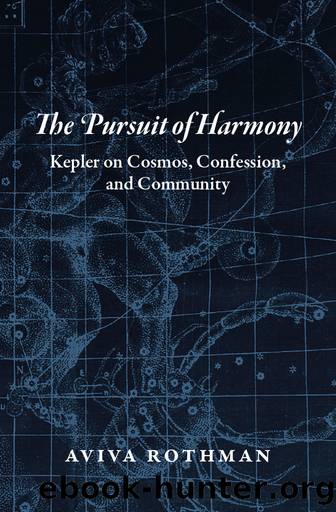The Pursuit of Harmony by Aviva Rothman;

Author:Aviva Rothman; [Rothman, Aviva]
Language: eng
Format: epub
ISBN: 9780226497020
Publisher: University of Chicago Press
Published: 2017-09-21T04:00:00+00:00
FIVE
âPolitical Digression(s)â: Kepler and the Harmony of the State
In 1623 Kepler contemplated writing about politics by way of fiction. He was deeply troubled by the brutal disputes ravaging the continent, yet he worried that expressing his concerns too strongly might not sit well with those who wielded political power. How, then, to portray just how terribly things in Europe had gone awry, without drawing too much princely ire? Kepler had already drafted a short fictional piece, titled Somnium (Dream). It was the story of a young manâs journey to the moon, and Kepler had not yet published it. It might be interesting, he mused, to use that story to reflect on the pressing political problems of his day. Perhaps the moon could be portrayed as a utopia, a place whose political perfection threw the troubles of Europe into stark relief? As he wrote to his friend Matthias Bernegger, âCampanella wrote a City of the Sun. What if I wrote one of the moon? Would it not be a wonderful deed to paint the barbarous habits of this time in vivid colors, but for the sake of caution to leave the earth with such a work and to withdraw to the moon?â Yet Kepler ultimately decided against such an approach. Politics was contentious enough, he believed, that taking even the circuitous route of fiction could be a dangerous undertaking. âHow would it help to hold back in this way?â he continued. âNeither More in his Utopia nor Erasmus in his Praise of Folly was safe, but each needed to defend himself. Therefore, let us thoroughly leave this pitch-black political terrain and remain in the pleasant greenery of philosophy.â1
While Kepler may have preferred to eschew political discussions, he could not avoid the political sphere entirely. He knew well that his post as imperial mathematician and adviser to the Holy Roman Emperor was a highly political one, and he referred to himself alternately as both a mathematicus and a politicus.2 He discussed political questions in his published astrological works, in letters to friends and patrons, in nativities that he was commissioned to produce, in reports that the emperor requested of him, in the prefaces and dedications to many of his astronomical or cosmological books, and even in a âpolitical digressionâ to his Harmony of the World. In the previous chapters, I focused on Keplerâs conception of himself as a Lutheran, a mathematician, and an astronomer. In this chapter, I turn to Keplerâs conception of politics, of himself as politician, and of the relationship between his political thought and his (natural) philosophical beliefs more broadly. In particular, taking a cue from Keplerâs brief consideration of the Somnium as political fiction, I consider the ways that Kepler applied the idea of fictio to politics, ways that went far beyond a single whimsical text.
The idea of political fiction has, of course, an ancient pedigree, one that influenced the ways that Kepler perceived and invoked it. In looking backward, we might turn first to Platoâs Republic. Platoâs
Download
This site does not store any files on its server. We only index and link to content provided by other sites. Please contact the content providers to delete copyright contents if any and email us, we'll remove relevant links or contents immediately.
De Catalaanse brief by Robert Goddard(262)
A Piece of Cake by Sarah Swatridge(207)
Nonlinear Dynamics and Chaos with Student Solutions Manual by Steven H. Strogatz(183)
The Ruin of J. Robert Oppenheimer by Priscilla J. McMillan(170)
Churchill's Spearhead by John Greenacre(162)
Flowering of the Cumberland by Harriette Simpson Arnow(145)
thing bounces back europe by Unknown(144)
Popular Culture and Political Identity in the Arab Gulf States by Alanoud Alsharekh Robert Springborg(138)
A Japanese View of Nature by Kinji Imanishi Pamela J. Asquith(128)
Comet Madness by Richard J. Goodrich(124)
Allied Bombing Raids by Philip Kaplan(123)
Guild and State by Antony Black(119)
A History of Science in Society by Ede Andrew;Cormack Lesley B.;(110)
RAF at the Crossroads by Greg Baughen(109)
History Without A Subject by David Ashley(108)
The Seventies Now: Culture As Surveillance by Stephen Paul Miller(107)
A History of Greek and Roman Philosophy by John Hackney(104)
Air Battle for Burma by Evans Bryn;(104)
Shocking Bodies by Iwan Rhys Morus(101)
